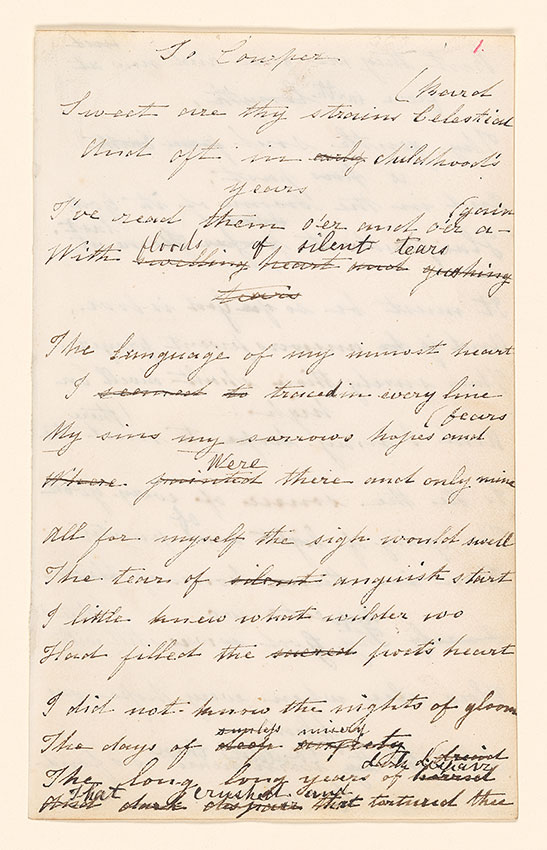“To Cowper”, p. 1

To Cowper and other poems : autograph manuscript of 9 poems, signed, 1842–1845
Purchased by Pierpont Morgan, 1900
“To Cowper” (pp. 1–3)
Dated 10 November 1842, when Brontë was twenty-two. The poem is addressed to the English poet William Cowper (1731–1800). First published in Poems (1846). Poem 19 in Chitham (1979).
To Cowper
Sweet are thy strains Celestial Bard
And oft in early childhood’s years
I’ve read them o’er and o’er again
With swelling heart and gushing tears floods of silent tears
The language of my inmost heart
I seemed to traced in every line
My sins my sorrows hopes and fears
Where painted [or printed] Were there and only mine
All for myself the sigh would swell
The tears of silent anguish start
I little knew what wilder wo
Had filled the [sacred] poet’s heart
I did not know the nights of gloom
The days of deep anxiety sunless misery;
The long long years of horrid dread dark despair
And dark despair that That crushed and tortured thee
Text as published in Poems (1846)
TO COWPER.
Sweet are thy strains, celestial Bard;
And oft, in childhood’s years,
I’ve read them o’er and o’er again,
With floods of silent tears.
The language of my inmost heart,
I traced in every line;
My sins, my sorrows, hopes, and fears,
Were there—and only mine.
All for myself the sigh would swell,
The tear of auguish start;
I little knew what wilder woe
Had filled the Poet’s heart.
I did not know the nights of gloom,
The days of misery;
The long, long years of dark despair,
That crushed and tortured thee.
| Attachment | Size |
|---|---|
| 15.07 MB |
“To Cowper”, p. 2

To Cowper and other poems : autograph manuscript of 9 poems, signed, 1842–1845
Purchased by Pierpont Morgan, 1900
“To Cowper” (pp. 1–3)
Dated 10 November 1842, when Brontë was twenty-two. The poem is addressed to the English poet William Cowper (1731–1800). First published in Poems (1846). Poem 19 in Chitham (1979).
But they are gone and now at last at length from earth,
Thy gentle soul from Earth is [has] past,
And in the bosome of its God
Has found its proper sheltering Home at last.
It must be so if for God is love,
And if he answers fervent prayer;
Then surely thou shalt dwell on high,
And I may hope to meet thee there
Is he the source of every good
The spring of light and of purity
Then in thine hours of blackest deepest wo
Surely Thy God so was still with thee?
How else when every hope was fled
Should thy warm heart Couldst thou so fondly cling
Text as published in Poems (1846)
But they are gone; from earth at length
Thy gentle soul is pass’d,
And in the bosom of its God
Has found its home at last.
It must be so, if God is love,
And answers fervent prayer;
Then surely thou shalt dwell on high,
And I may meet thee there.
Is he the source of every good,
The spring of purity?
Then in thine hours of deepest woe,
Thy God was still with thee.
How else, when every hope was fled,
Couldst thou so fondly cling
| Attachment | Size |
|---|---|
| 15.07 MB |
“To Cowper”, p. 3

To Cowper and other poems : autograph manuscript of 9 poems, signed, 1842–1845
Purchased by Pierpont Morgan, 1900
“To Cowper” (pp. 1–3)
Dated 10 November 1842, when Brontë was twenty-two. The poem is addressed to the English poet William Cowper (1731–1800). First published in Poems (1846). Poem 19 in Chitham (1979).
To holy things and holy men
And how couldst thou so sweetly sing—
Of things that God alone could teach?
And whence that Angel purity;
That hatred of all sinful ways
That kind and gentle charity?
Are these the symptoms of a heart
Of every Heavenly grace bereft
For ever bannished from its God
To Satan[’]s wildest fury left?
Yet, should thy blackest darkest fears be true
If Heaven’s decrees be so severe
That such a soul as thine is lost
O! how my God shall I appear?
Anne Brontë
Nov – 10th 1842
Text as published in Poems (1846)
To holy things and holy men?
And how so sweetly sing,
Of things that God alone could teach?
And whence that purity,
That hatred of all sinful ways—
That gentle charity?
Are these the symptoms of a heart
Of heavenly grace bereft:
For ever banished from its God,
To Satan’s fury left?
Yet, should thy darkest fears be true,
If Heaven be so severe,
That such a soul as thine is lost,—
Oh! How shall I appear?
| Attachment | Size |
|---|---|
| 15.07 MB |